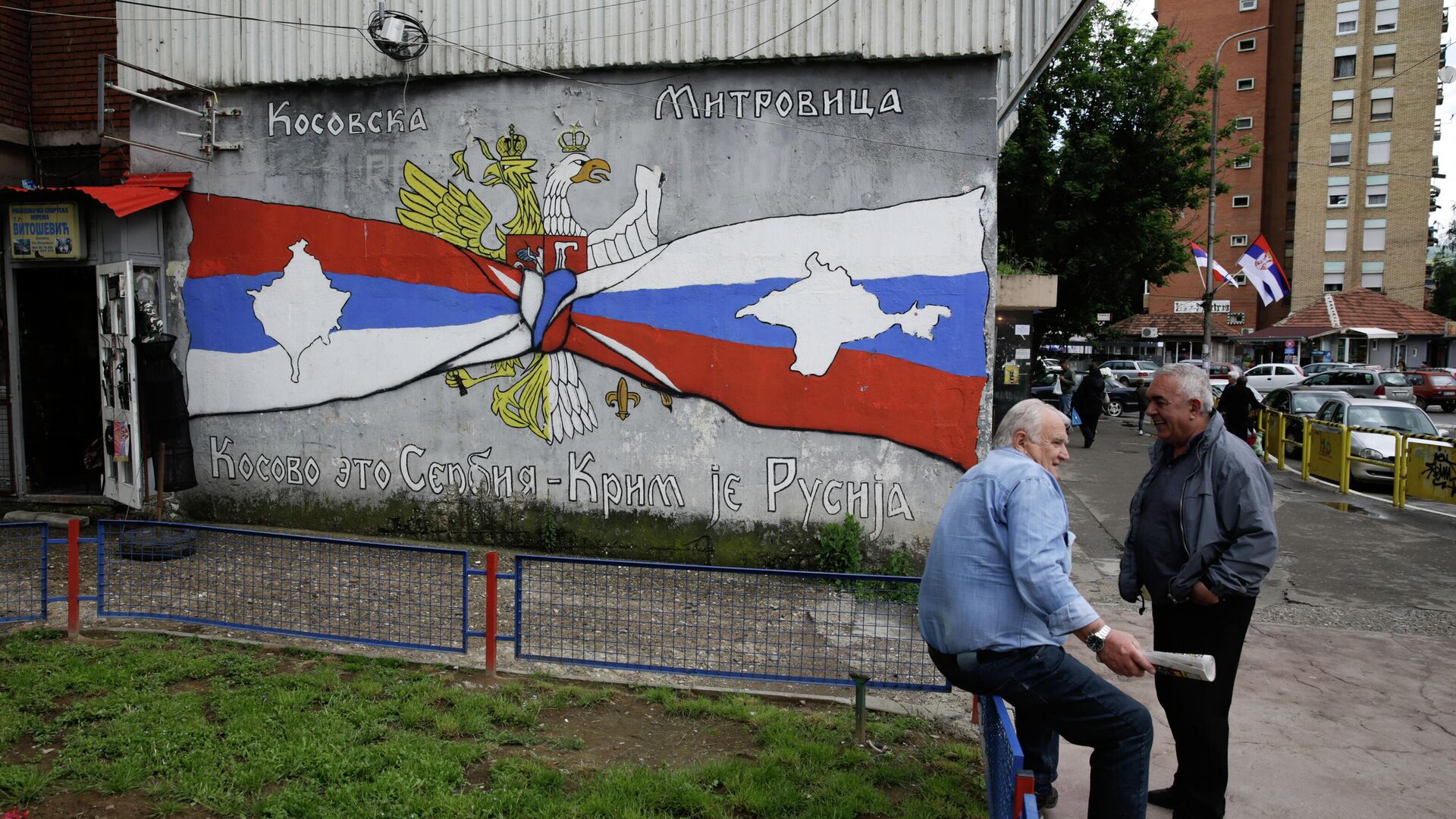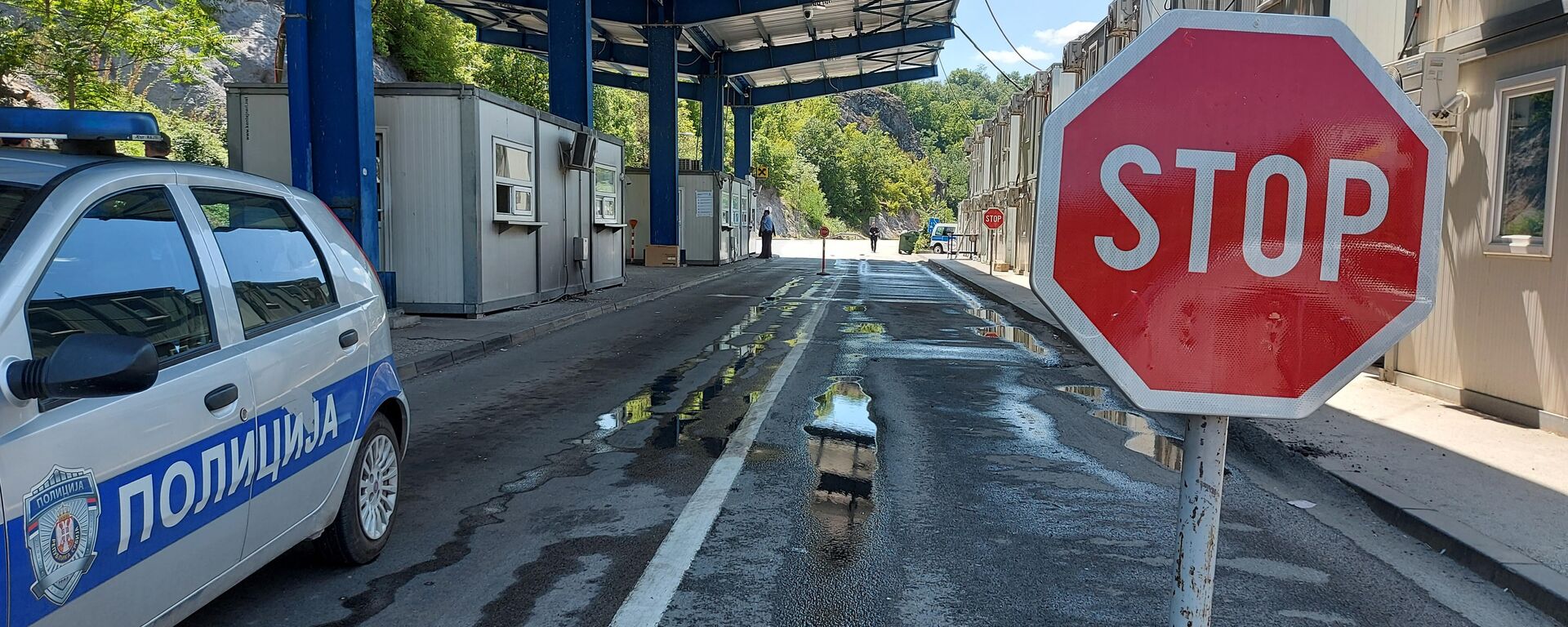https://sputnikglobe.com/20220801/analyst-kosovo-crisis-postponed-for-a-month-washington-behind-provocation-1098008799.html
Analyst: Kosovo Crisis Postponed for a Month, Washington Behind Provocation
Analyst: Kosovo Crisis Postponed for a Month, Washington Behind Provocation
Sputnik International
Tensions erupted around the self-proclaimed Republic of Kosovo after Pristina decided to impose a ban on the entry of vehicles with Serbian license plates from... 01.08.2022, Sputnik International
2022-08-01T17:48+0000
2022-08-01T17:48+0000
2022-08-01T17:48+0000
us
europe
russia
kosovo
serbia
aleksandar vucic
pristina
provocation
protests
https://cdn1.img.sputnikglobe.com/img/07e6/07/1f/1097986140_0:0:3153:1774_1920x0_80_0_0_7b4ef6e64f9edfecebbea84c093c592f.jpg
"The escalation was not, in itself, serious, given there have been several similar 'crises' in the area since Kosovo declared independence in 2008," explained political analyst Joe Quinn.In the wake of growing Serbian protests, the de facto authorities of Kosovo postponed their decision to implement a ban on Serbian license plates and identification cards until September 1.Local media reported that Pristina backed down following a meeting between US Ambassador Jeffrey Hovenier and the Kosovo leadership. The postponement was agreed under the condition that barricades built by Serbs in northern Kosovo be removed. Prior to that, the NATO-led Kosovo Force (KFOR) mission signaled that it was ready to intervene if stability in the region was compromised.Serbian President Aleksandar Vucic condemned Pristina's ban on July 31, stressing that the leadership of the self-proclaimed republic had planned the provocation at all levels for a very long time. The Serbian president also revealed that Belgrade asked international representatives to do everything possible to stop the crisis escalation in the region.Similarly, Vucic addressed the Serbs living in Kosovo's northern areas, thanking them for their "restraint and courage." "No matter how difficult it is, there will be no surrender, Serbia will win," stated the president.The political analyst highlighted that Pristina is acting in breach of the 2013 Brussels Agreement. The agreement guaranteed that "there will be an association/community of Serb majority municipalities in Kosovo" with substantial local powers and ties to Serbia. The treaty was negotiated and concluded in Brussels under the auspices of the European Union. Belgrade was joined in not recognizing the self-proclaimed Kosovo Republic by the majority of the world's countries, with just 97 states seeing it as an independent entity.Furthermore, the political analyst suggested that Pristina's actions were emboldened by the Biden administration."Five days ago, a high level Kosovo government delegation was hosted at the US State Department," he said. "This unambiguous support from Washington DC is very likely a major factor in the Kosovo government's non-adherence to its commitments under the agreement and its increasingly belligerent stance towards the Serbian population of Kosovo."Quinn believes that it's not a coincidence that Pristina's provocation came amid Russia's special military operation in Ukraine, adding that Moscow has long maintained close historic ties with the people of Serbia.On July 31, Russian Foreign Ministry spokesperson Maria Zakharova criticized Pristina and its backers in Brussels and Washington for an attempted expulsion of the Serbian population and Serbian social institutions from Kosovo, calling upon the international community to observe the rights of Serbs in the region.
https://sputnikglobe.com/20220801/emboldened-kosovo-stokes-tension-with-serbia-after-getting-blinkens-blessing-expert-says-1098006938.html
russia
kosovo
serbia
pristina
Sputnik International
feedback@sputniknews.com
+74956456601
MIA „Rosiya Segodnya“
2022
News
en_EN
Sputnik International
feedback@sputniknews.com
+74956456601
MIA „Rosiya Segodnya“
Sputnik International
feedback@sputniknews.com
+74956456601
MIA „Rosiya Segodnya“
us, europe, russia, kosovo, serbia, aleksandar vucic, pristina, provocation, protests
us, europe, russia, kosovo, serbia, aleksandar vucic, pristina, provocation, protests
Analyst: Kosovo Crisis Postponed for a Month, Washington Behind Provocation
Tensions erupted around the self-proclaimed Republic of Kosovo after Pristina decided to impose a ban on the entry of vehicles with Serbian license plates from August 1, 2022. This prompted Serbs, who maintain large communities in northern Kosovo, to kick off a protest movement. Sirens and shots were heard on Sunday night in the north of Kosovo.
"The escalation was not, in itself, serious, given there have been several similar 'crises' in the area since Kosovo declared independence in 2008," explained political analyst Joe Quinn.
"However, when placed in the context of the ongoing US proxy war against Russia, and Russia's steadfast support for Serbia, this particular incident takes on a more serious tone as potentially being part of the US' broader geopolitical war against Russia."
In the wake of growing Serbian protests, the de facto authorities of Kosovo postponed their decision to implement a ban on Serbian license plates and identification cards until September 1.
Local media reported that
Pristina backed down following a meeting between US Ambassador Jeffrey Hovenier and the Kosovo leadership. The postponement was agreed under the condition that barricades built by Serbs in northern Kosovo be removed. Prior to that, the NATO-led Kosovo Force (KFOR) mission signaled that it was ready to intervene if stability in the region was compromised.
Serbian President Aleksandar Vucic
condemned Pristina's ban on July 31, stressing that the leadership of the self-proclaimed republic had planned the provocation at all levels for a very long time. The Serbian president also revealed that Belgrade asked international representatives to do everything possible to stop the crisis escalation in the region.
Similarly, Vucic addressed the Serbs living in Kosovo's northern areas, thanking them for their "restraint and courage." "No matter how difficult it is, there will be no surrender, Serbia will win," stated the president.
"The postponement merely defers the problem for one month," warned Quinn. "If Pristina attempts to re-impose the same rules on Kosovo Serbs at the beginning of September, tensions will very likely flare once more."
The political analyst highlighted that Pristina is acting in breach of the 2013 Brussels Agreement. The agreement guaranteed that "there will be an association/community of Serb majority municipalities in Kosovo" with substantial local powers and ties to Serbia. The treaty was negotiated and concluded in Brussels under the auspices of the European Union. Belgrade was joined in not recognizing the self-proclaimed Kosovo Republic by the majority of the world's countries, with just 97 states seeing it as an independent entity.
"The US and EU have repeatedly failed to pressure the Kosovo government to fulfill their obligations of the so-called Brussels Agreement signed in 2013," said Quinn. "This is despite the fact that the Serbian government fulfilled its requirements under the agreement to dismantle 'parallel' Serbian police and judicial structures in Kosovo and convince the Kosovo Serbs to accept integration into the Kosovo police and legal system."
Furthermore, the political analyst suggested that Pristina's actions were emboldened by the Biden administration.
"Five days ago, a high level Kosovo government delegation was hosted at the US State Department," he said. "This unambiguous support from Washington DC is very likely a major factor in the Kosovo government's non-adherence to its commitments under the agreement and its increasingly belligerent stance towards the Serbian population of Kosovo."
Quinn believes that it's not a coincidence that Pristina's provocation came amid Russia's special military operation in Ukraine, adding that Moscow has long maintained close historic ties with the people of Serbia.
On July 31, Russian Foreign Ministry spokesperson Maria Zakharova
criticized Pristina and its backers in Brussels and Washington for an attempted expulsion of the Serbian population and Serbian social institutions from Kosovo, calling upon the international community to observe the rights of Serbs in the region.




